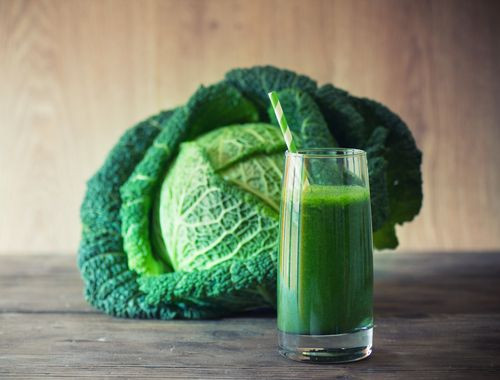6 Kale Health Benefits That Will Help You Live Longer And Live Well

Our love for the versatile dark, leafy green kale is no secret as it's grown in popularity over the past years and has blossomed into a superfood due to its key nutrients. Kale’s culinary flexibility has proven to be a good measure of how this nutritional powerhouse can be beneficial to our health. Known as “the queen of greens,” adding the vegetable to your diet — in the form of salads, soups, stews, stir-fries, and smoothies — can boost your lifespan by anything from protecting against cancer to treating arthritis.
1. Kale Helps Build Strong Bones
While many of us may drink milk for strong bones and to improve our overall bone health, kale actually contains more calcium than milk. Kale and oranges are considered to be among the many fruits and vegetables that have a high content in vitamins that can strengthen and protect your skeleton. “Your bones need many nutrients to stay mineralized; your skeleton must get enough calcium to keep up with the process of bone,” said Dr. Maina Sinha, an assistant professor of medicine at Weill Cornell Medical School and metabolic bone disease expert, in the college’s Women’s Health issue. Sinha considers dairy food and leafy green vegetables, such as spinach and kale, as the best dietary sources of calcium. Kale’s vitamin K content is essential for a wide variety of bodily functions, which include normal bone health.
2. Kale Helps Combat Inflammation
The super-nutritious veggie contains plenty of phytonutrients, such as quercetin, which helps combat inflammation and prevent arterial plaque formation, and sulforaphane, a cancer-fighting compound. The anti-inflammatory food can lower the risk for chronic illnesses such as cardiovascular disease, arthritis, and autoimmune disorders, and may even help reverse them. According to Organic Authority, a one-cup serving of cooked kale provides about 10 percent of the recommended daily allowance (RDA) of omega-3 fatty acids that help fight these inflammatory diseases.
3. Kale Helps Build a Better Body Through Detox
To become healthy from the inside and out, kale is both helpful for detoxifying the body and keeping the liver healthy. The low-calorie and zero-fat food can be consumed raw in a salad or in a smoothie to help replenish the body. Detoxes with kale are specifically designed to make sure the liver is kept clean of impurities, says MindBodyGreen, and to supply it with healthy nutrients that it needs to function properly. An overloaded liver can affect all of the other organs in the body, including the heart and brain.
4. Kale Helps Improve Your Eyesight
Kale contains lutein and zeaxanthin compounds, carotenoids, which act like sunglass filters and help prevent damage to the eyes from excessive exposure to ultraviolent light, according to Life Extension Magazine. A study published in the American Journal of Clinical Nutrition found people with a history of eating lutein-rich foods like kale had a 22 percent lower risk of cataracts, which would otherwise have been severe enough to require extraction. Dietary antioxidants, such as kale, play a role in the prevention of age-related cataracts or the risk of macular degeneration.
5. Kale Helps Boost Your Brain Health
The nutrient-dense veggie contains essential vitamins and minerals that the brain is contingent on to function. Kale contains 684 percent RDA of vitamin K, which is a powerful antioxidant nutrient that protects fat and has long been associated with blood clotting. Vitamin K is needed to make the "specialized fats called sphingolipids that create the structure of our brain cells, and it promotes brain cells being more resilient by influencing gene expression," wrote Dr. Drew Ramsey, Assistant Clinical Professor of Psychiatry, Columbia University and New York State Psychiatric Institute, in a blog post in The Huffington Post.
The brain food also contains manganese that helps brain function, which can better help you focus on daily tasks at work and give you a pick-me-up. Perhaps next time you eat kale you will notice you feel lighter and brighter, compared to how you feel after eating other foods. If your brain is healthy, you feel happy, and active.
6. Kale Helps Protect Against Cancer
Kale contains phytonutrients that help battle free radical damage — linked to increased cancer risk. Even for current cancer patients, the dark, leafy green could be used to fight cancer cells or to become cancer-free again. A study published in the journal International Urology and Nephrology, found the phytonutrient and its sulforaphane content in kale can help protect against bladder cancer, the sixth most commonly diagnosed cancer in the U.S. The findings indicated a potentially important role for dietary fat and pickled vegetables in bladder cancer.
It’s time to add kale to your diet to live a long and healthy life.
Published by Medicaldaily.com



























